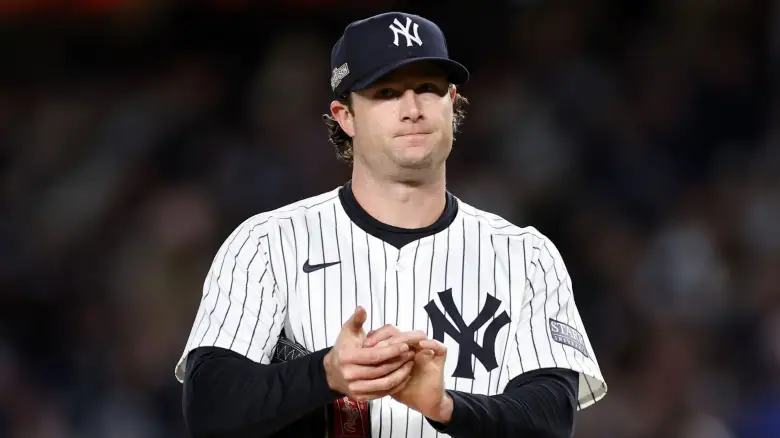The New York Yankees, one of Major League Baseball’s most storied franchises, are no strangers to high-pressure scrutiny. With 27 World Series titles and a fanbase that demands excellence, the team’s internal dynamics are perpetually under a microscope. Yet even by their standards, the recent controversy ignited by ace pitcher Gerrit Cole’s explosive accusation—that an unnamed teammate is “poisoning” the Yankees’ clubhouse—has sent shockwaves through the baseball world. This revelation, dripping with intrigue and tension, raises critical questions about leadership, accountability, and the fragile chemistry required to sustain success in professional sports.

The Anatomy of a Bombshell
Gerrit Cole, the Yankees’ $324 million ace and a perennial Cy Young contender, did not mince words during a closed-door meeting leaked to the press. Sources close to the team revealed that Cole accused a fellow player—whose identity remains undisclosed—of fostering a toxic environment through selfish behavior, lack of accountability, and undermining team unity. Cole reportedly emphasized that the individual’s actions were not merely personal grievances but systemic issues eroding the club’s competitive edge. The timing of this accusation is particularly striking: the Yankees, despite boasting a roster laden with All-Stars, have underperformed in recent seasons, stumbling in critical postseason moments. Cole’s outburst suggests that internal fractures, rather than external factors, may be at the heart of their struggles.
The Yankees’ High-Stakes Culture
To understand the gravity of Cole’s claims, one must first grasp the unique pressures of playing for the Yankees. The franchise’s legacy is built on icons like Babe Ruth, Derek Jeter, and Mariano Rivera—players who embodied clutch performance and selfless leadership. The modern Yankees, however, have faced criticism for relying on free-agent splurges rather than organic team-building. Billion-dollar investments in stars like Cole, Aaron Judge, and Giancarlo Stanton created sky-high expectations, but chemistry cannot be bought. Cole’s accusation hints at a deeper truth: assembling talent is futile without cohesion. The Yankees’ clubhouse, once a symbol of disciplined professionalism, now appears fractured, with Cole’s comments exposing a possible mutiny against complacency.
The Poisonous Player: Speculation and Impact
While Cole stopped short of naming names, speculation runs rampant. Analysts have pointed fingers at several veterans whose performances or attitudes have drawn ire. One theory targets a high-profile slugger accused of prioritizing personal stats over team strategy, allegedly refusing to adjust his approach in critical situations. Another rumor implicates a pitcher whose public critiques of coaching decisions have reportedly alienated teammates. Regardless of the culprit, the impact is undeniable. A “poisonous” presence in a locker room can metastasize, breeding resentment, cliques, and a loss of collective focus. For a team that relies on precision and trust—especially in high-leverage playoff games—such discord is catastrophic.
Leadership in Crisis
Cole’s decision to speak out underscores a vacuum in the Yankees’ leadership structure. Captaincy in baseball is informal, rooted in respect rather than title, and the team has long relied on veterans to set the tone. Aaron Judge, the face of the franchise, has been a vocal leader, but his influence may be diluted by the sheer number of strong personalities in the clubhouse. Manager Aaron Boone, often criticized for his affable but hands-off approach, now faces pressure to address the dysfunction. Cole’s move to publicly shame a teammate—even indirectly—signals desperation. It suggests that traditional channels for resolving conflict, whether through coaching staff or peer intervention, have failed.

Historical Parallels and Lessons
The Yankees are no strangers to locker-room turmoil. The 1970s saw Reggie Jackson’s infamous “Straw That Stirs the Drink” feud with manager Billy Martin, a saga that highlighted clashing egos but also galvanized a championship team. More recently, the 2018 club faced criticism for its “toxic” atmosphere, with veterans like Sonny Gray and Jacoby Ellsbury clashing with coaches. Yet those issues were often dismissed as growing pains. Cole’s accusations, however, strike at the core of the current roster’s identity. They echo the 2021 scandal involving the Houston Astros’ sign-stealing scheme, in which Cole himself was indirectly implicated during his tenure with the team. For Cole to now position himself as a whistleblower—even in a different context—adds layers of complexity to his legacy.
The Path Forward: Accountability and Unity
For the Yankees, the road to redemption begins with accountability. Cole’s allegations cannot be swept under the rug; ownership and management must investigate the claims and take decisive action. This could mean trades, benchings, or even releases, but inaction risks validating the toxicity. Simultaneously, the team must rebuild trust. Closed-door meetings, team-building exercises, and a renewed emphasis on collective goals over individual accolades are essential. The Yankees’ front office, led by Brian Cashman, also bears responsibility: years of prioritizing star power over cultural fit have left the roster imbalanced.
Broader Implications for Baseball
This scandal transcends the Yankees. It reignites debates about the ethics of modern clubhouse culture, where massive contracts and social media influence can empower players to both uplift and undermine teams. MLB has seen similar dramas—the 2023 Mets’ collapse, the Padres’ dysfunction under A.J. Preller—but the Yankees’ spotlight magnifies the stakes. Cole’s actions may inspire other stars to speak out against internal issues, challenging the sport’s often opaque code of silence.
Conclusion: A Defining Moment
Gerrit Cole’s explosive accusation marks a defining moment for the Yankees and Major League Baseball. It is a stark reminder that talent alone cannot paper over cracks in a team’s foundation. The coming weeks will test the organization’s resolve: Will they confront the poison in their ranks, or will they succumb to the same complacency that has derailed their recent campaigns? For Cole, the stakes are equally high. His legacy as a leader now hinges on whether his bold move unites the team or deepens its divides. In the crucible of New York’s unforgiving spotlight, the answers will shape not just a season, but an era.